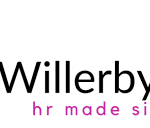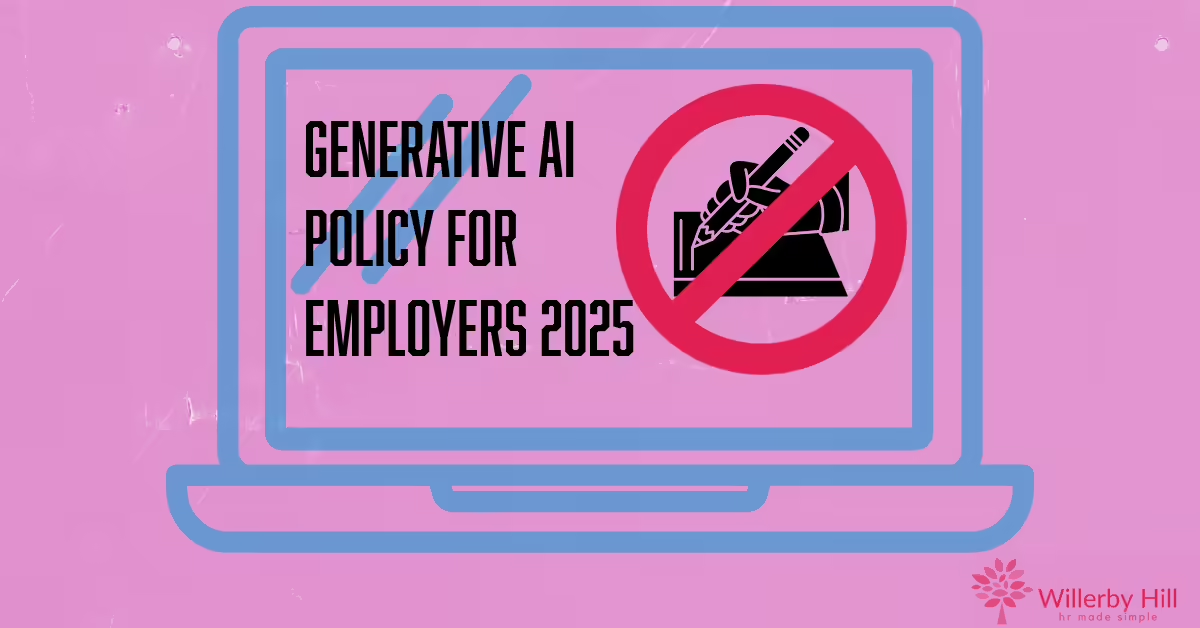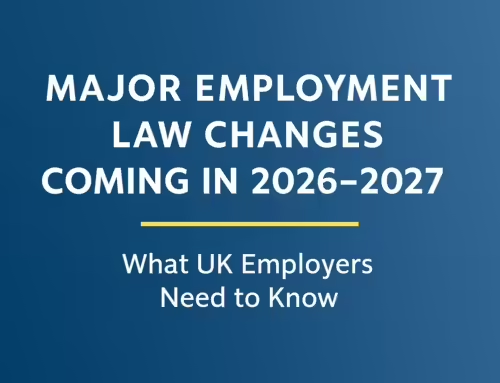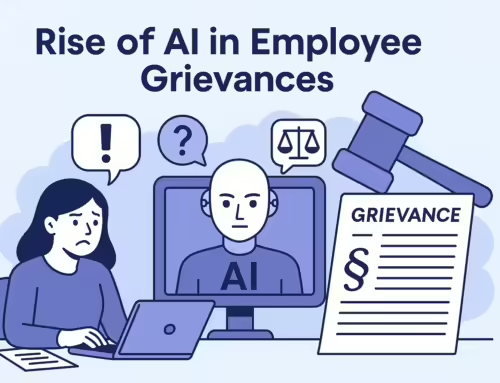An AI policy is set to become a must-have for every business this year. Over the course of 2024, generative artificial intelligence (Gen AI) transitioned from a scary, unknown entity into a trillion dollar business which is present in every aspect of our lives. Thanks to companies such as Meta, OpenAi and Google adopting GPT (Generative Pre-trained Transformers) technology, documents can be analysed, images can be created and emails can be written in a fraction of the time it would take for a human to complete the same task.
With 92 percent of companies planning to increase their AI investments over the next three years according to McKinsey, employers will need to establish their position regarding the use of generative AI by their employees through the implementation of a clear AI policy in their workplace.

Whilst AI in general has been used across multiple industries for decades such as Netflix’s recommendation algorithms and video game programming, the concept of accessible, generative AI at the fingertips of every employee at an organisation is an entirely new phenomenon. The relative infancy of this technology means that the full functionality of Gen AI is not known and cannot be covered by a singular AI policy however, there are already commonplace uses of Gen AI in the workplace which all employers should be aware of.
The most common ways employees across all industries are using generative AI include…
- Creating images and graphics for branding and marketing
- Writing emails and summarising communications
- Writing and summarising policies and reports
- Coding and web design
- Idea generation for business strategies and campaigns
Generative AI has simplified many of these tasks and ensured that work can be completed more efficiently than previously. Employers may encourage their employees to use generative AI to complete basic yet time-consuming tasks in order to focus on the more technical aspects of their roles.
If generative AI is to become the future of the modern workplace, employers need to ensure they are ahead of the curve in terms of creating a clear AI policy for all employees to follow.

Why do you need an AI policy?
While the benefits outlined previously may make generative AI seem like the corporate world’s saviour, sparing employees from boring, repetitive tasks, if employers want their team to effectively use generative AI, they should have a comprehensive AI policy in place.
The main reason an AI policy is so important in 2025 is because there are several risks and unknown factors in terms of interacting with generative AI platforms in a business setting. These factors include:
- A generative AI platform providing an incorrect response which if not verified and checked, could lead to a company spreading misinformation.
- The responses given by these platforms are based on existing information which means there is a chance of bias within their answers as well as a risk of plagiarism.
- The fast development of this sector means that there are concerns regarding the security and confidentiality of these platforms, especially in terms of inputting confidential company data.
While these are just a selection of the risks involved in using AI in the workplace, employers need to understand the specific concerns of their industry which would need to be addressed by an AI policy.
These concerns are most prominent in creative industries such as entertainment, arts and marketing which employ millions of workers who are solely responsible for the creation and publication of content, something Gen AI can seemingly do faster and cheaper. While there are industry-wide movements towards regimented AI guidance , such as the 2023 WGA strike, there is currently no global advice in terms of how to use AI in the workplace ethically.
It also appears that the government does not have any plans to incorporate strict labour laws regarding gen AI as part of their Employment Rights Bill 2024 although this may change as the importance of this industry continues to grow at an unprecedented rate. Despite this domestic negligence towards AI, the European Union has enacted the first AI Act which provides key definitions and guidelines which tech companies must follow in order for these platforms to operate in this region, a landmark piece of legislation which may influence others global powers to follow suit.
This means that, for now, the responsibility of outlining what constitutes responsible use of AI has fallen on employers, required to outline their own AI policy in order to negate the possible risks involved with these platforms.

What should you include in your AI policy?
As stated previously, AI platforms are constantly evolving and changing with their capabilities still not completely known. Therefore, these suggestions for what your AI should include are using information available at the time of writing (February 2025) and you should consult a professional before implementing an AI policy.
Introduction
Your AI policy should begin by defining AI and outlining the key platforms which your employees may already be aware of or even already using in the workplace, regardless of your personal stance on the technology. An example of how an individual could begin their AI policy can be found below:
At [insert company name] we recognise that AI, specifically generative AI and GPT models are a widely used tool for the automation of tasks and content creation. Popular examples of these tools include:
- Chat GPT
- Dall-E
- Claude
- Google Gemini
- Microsoft Copilot
- Github Copilot
- Apple Intelligence
- Midjourney
There are many other similar products and there are new companies emerging constantly therefore, this policy will be updated regularly.
Your Stance
Your AI policy should next make your company’s specific stance on the use of artificial intelligence in the workplace. Examples that could be used to outline an employer’s AI stance can be seen below:
We understand the importance of AI in the modern world and are committed to embracing new technologies however, we also understand that there are certain risks in terms of using AI in the workplace therefore, a clear AI policy is necessary.
OR
Despite the prevalence of these AI platforms across various industries, we believe that there are too many risks and unknown factors in terms of using AI in the workplace. Therefore we are taking a zero-tolerance policy in terms of the use of AI by employees.
Risks
Regardless of what stance you may take, it is advisable that you outline the risks involved in terms of using AI in the workplace, should as those outlined previously. You may also wish to include any industry-specific risks such as the use of sensitive data or use of company logos/ branding. You may also want to consult with a professional during the process of writing an AI policy in order to ensure all possible risks are covered. You could also discuss the topic of AI with your employees in order to understand how they may be using AI and any concerns that they may have regarding the topic.
Conclusion
If your company has decided to allow employees to use AI in the workplace, you may wish to require specific approval in terms of accessing these platforms.
If this is the case, your AI policy should state the method of acquiring approval which employees must go through. This may involve communicating with your organisation’s IT department or submitting a formal request. Much like any other work application, you may wish to request employees only use AI platforms for work purposes.
Finally, as with any other workplace policy, you may wish to include the individual who employees should contact if they have any concerns regarding the use of AI in the workplace.
If you have any concerns or questions regarding creating and implementing an AI policy in your workplace or have any other HR and employment law queries, you can get in touch with Willerby Hill here.




